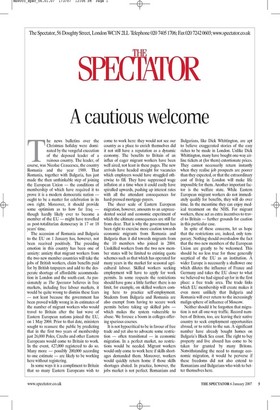A cautious welcome
The news bulletins over the Christmas holiday were dominated by the vengeful execution of the deposed leader of a ruinous country. The leader, of course, was Nicolae Ceaucescu, the country Romania and the year 1989. That Romania, together with Bulgaria, has just made the then unthinkable step of joining the European Union — the conditions of membership of which have required it to prove it is a modern democratic nation — ought to be a matter for celebration in its own right. Moreover, it should provide some optimism as to how far Iraq — though hardly likely ever to become a member of the EU — might have travelled as post-totalitarian democracy in 17 or 18 years' time.
The accession of Romania and Bulgaria to the EU on 1 January has, however, not been received positively. The presiding emotion in this country has been one of anxiety: anxiety that migrant workers from the two new member countries will take the jobs of British workers, claim benefits paid for by British taxpayers and add to the desperate shortage of affordable accommodation in London and the south-east. As passionately as The Spectator believes in free markets, including free labour markets, it would be quite wrong to dismiss these fears — not least because the government has been proved wildly wrong in its estimates of the number of migrant workers who would travel to Britain after the last wave of Eastern European nations joined the EU, on 1 May 2004. Prior to that date, ministers sought to reassure the public by predicting that in the first two years of membership just 26,000 Poles, Czechs and other Eastern Europeans would come to Britain to work. In the event, 427,000 registered to do so. Many more — possibly 200,000 according to one estimate — are likely to be working here without registering.
In some ways it is a compliment to Britain that so many Eastern Europeans wish to come to work here: they would not see our country as a place to enrich themselves did it not still have a reputation as a dynamic economy. The benefits to Britain of an influx of eager migrant workers have been well aired, not least in these pages. The new arrivals have headed straight for vacancies which employers would have struggled otherwise to fill. They have suppressed wage inflation at a time when it could easily have spiralled upwards, pushing up interest rates with all the attendant consequences for hard-pressed mortgage-payers.
The sheer scale of Eastern European migration, however, amounts to an unprecedented social and economic experiment of which the ultimate consequences are still far from clear. That is why the government has been right to exercise more caution towards economic migrants from Romania and Bulgaria than it did towards migrants from the 10 members who joined in 2004. Unskilled workers from the two new member states will be limited to existing quota schemes such as that which has operated for many years in the market for seasonal agricultural labour. Skilled workers seeking employment will have to apply for work permits. In some respects the restrictions should have gone a little further: there is no limit, for example, on skilled workers coming here to practice self-employment. Students from Bulgaria and Romania are also exempt from having to secure work permits before taking up skilled jobs — which makes the system vulnerable to abuse. We foresee a boom in colleges offering spurious courses.
It is not hypocritical to be in favour of free trade and yet also to advocate some restriction — often transitional — in economic migration. In a perfect market, no restrictions would be needed. Migrant workers would only come to work here if skills shortages demanded them. Moreover, workers would quickly return home if those skills shortages abated. In practice, however, the jobs market is not perfect. Romanians and Bulgarians, like Dick Whittington, are apt to believe exaggerated stories of the easy riches to be made in London. Unlike Dick Whittington, many have bought one-way airline tickets at (for them) extortionate prices. They cannot necessarily return instantly when they realise job prospects are poorer than they expected, or that the extraordinary cost of living in London will make life impossible for them. Another important factor is the welfare state. While Eastern European migrant workers do not immediately qualify for benefits, they will do over time. In the meantime they can enjoy medical treatment on the NHS. For migrant workers, these act as extra incentives to travel to Britain — further grounds for caution in this particular case.
In spite of these concerns, let us hope that the restrictions are, indeed, only temporary. Nothing should overshadow the fact that the two new members of the European Union are greatly to be welcomed. This should be no less true for those generally sceptical of the EU as an institution. A wider Europe is necessarily a shallower one which dilutes the influence of France and Germany and takes the EU closer to what we believed we had signed up for in the first place: a free trade area. The trade links which EU membership will create makes it even more unlikely that Bulgaria and Romania will ever return to the increasingly malign sphere of influence of Moscow.
Neither should it be forgotten that migration is not all one-way traffic. Record numbers of Britons, too, are leaving their native country to seek employment opportunities abroad, or to retire to the sun. A significant number have already bought homes on Bulgaria's Black Sea coast. The right to buy property and live aboard has come to be taken for granted by many Britons. Notwithstanding the need to manage economic migration, it would be perverse if these freedoms did not also extend to Romanians and Bulgarians who wish to better themselves here.




































 Previous page
Previous page